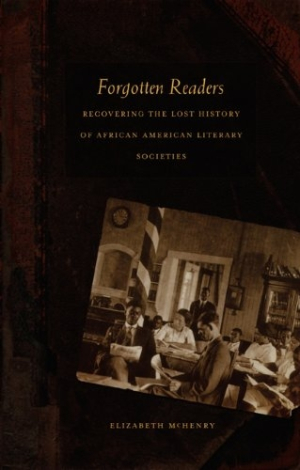Forgotten Readers
Recovering the Lost History of African American Literary Societies
This book is a remarkable piece of literary historical recovery. The author traces the rise and development of African American literary societies from the pre-Civil War era to the Harlem Renaissance, and shows how those societies “have worked to promote activism, to foster resistance, and to create citizens in black communities throughout the United States.” Many readers are likely unaware that such societies even existed before the Civil War, and those who know of them may be surprised that documents still exist in quantities sufficient to allow study. McHenry deserves great praise for her detective work.
The book focuses primarily on three time periods: Antebellum, post-Reconstruction-early twentieth century (the Age of Washington, as McHenry calls it), and the Harlem Renaissance era (1920s-1940). She also devotes a chapter to the role of literary societies during the women’s movement of the turn of the last century. An epilogue attempts to bring the study up to date by examining the huge success of Oprah Winfrey’s Book Club and other contemporary examples, but the chapter feels out of place because of the chronological gap. That chapter would have been better published in an academic journal.
Perhaps the best section of McHenry’s study is her examination of the literary societies of the late nineteenth century, one in Washington D.C. and the other in Boston. The author provides a rich context for understanding the debates in African American circles about the proper role of its people in the larger American society. The differing sides in these debates are usually understood in relationship to their most prominent spokesmen, Booker T. Washington and W. E. B. DuBois. But as McHenry aptly demonstrates, these two men did not emerge from a vacuum. The issues and beliefs they espoused were in the public consciousness well before either man rose to national prominence.
The greatest flaw of the book, besides the epilogue, is repetition, especially during the discussion of Antebellum societies. The records are so sparse, and the goals and aspirations of the societies are so similar, that the chapter feels overly long.
Because African Americans were so long denied a formal education either by law or by practice, the oral nature of African American culture is often emphasized. McHenry’s study will force us to reconsider the role that reading and the written text have played in African American culture.
Reviewed by
Erik Bledsoe
Disclosure: This article is not an endorsement, but a review. The publisher of this book provided free copies of the book to have their book reviewed by a professional reviewer. No fee was paid by the publisher for this review. Foreword Reviews only recommends books that we love. Foreword Magazine, Inc. is disclosing this in accordance with the Federal Trade Commission’s 16 CFR, Part 255.

